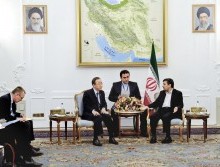
The death toll in the ongoing protests in Iran continues to rise, with the Iran Human Rights organization on Monday saying more than 75 people had been killed so far, including women and children. Furthermore, the organization confirmed based on video evidence that police have fired live ammunition at protestors, a crime Amnesty International had reported the prior week. The protests, in response to the death of Mahsa Amini who died after being taken into custody by Iran’s “morality police”, have been raging since the middle of the month and come at a tense time for Tehran amid international negotiations on their nuclear program.
A renewed nuclear deal—which would provide Iran with significant sanctions relief in exchange for self-imposed restrictions on their nuclear program—seemed imminent last month, only for Iran’s tough counterproposal to undercut the talks. United States Secretary of State Antony Blinken has said Iran’s latest offer took the negotiations “backwards”, while Israel sounded encouraged that a deal Prime Minister Yair Lapid has called “dangerous” had been prevented so far.
Then came the death of Amini, whom the Iran Human Rights organization, the US and others have all said was caused by the Iranian security forces. The Iran Human Rights organization reported on their website that witnesses said Amini was beaten by police after she was arrested by the Guidance Patrol officers. Blinken, in a statement published by the State Department, condemned the “brutal death” of Amini while noting she died in the morality police custody for “purportedly wearing a hijab too loosely”—referencing the traditional Muslim headscarf worn by women.
In addition to cracking down on civilians protesting Amini’s death, Iranian authorities have disrupted internet access as well—a common tactic when trying to stifle public outcry. The US emplaced sanctions on Iran’s morality police and others, while also is providing a sanctions waiver for companies to provide certain software and hardware in Iran to provide internet access.
While the US is trying to publicly separate their condemnation of human rights abuses in Iran from the nuclear talks, the timing isn’t ideal for progress towards a renewal of the deal—known as the Joint Comprehensive Plan of Action (JCPOA). Last week, a US Senior State Department Official told reporters in a background briefing published by the State Department that the JCPOA was “never intended to and did not address other points of concern about Iran’s policies,” including human rights abuses.
Highlighting the latest sanctions against the morality police, the Senior State Department Official said, “We are going to continue to use all of the tools that are available to us to address those other points of concerns that we have about Iran, whether we’re negotiating to return to the JCPOA, in the JCPOA, or not.”
In view of the Americans continued interest in resurrecting the nuclear deal with Iran, and despite Israel’s relief that the insufficient proposal was not accepted, Israel has not ended their diplomacy against a bad Iran deal.
During last week’s call with British Prime Minister Liz Truss, Lapid specifically mentioned the Iran talks according to a summary of the call published by Israel. Per the Israelis, Lapid “emphasized to Prime Minister Truss the necessity of avoiding further compromises with Iran, and further emphasized that Israel’s expectation is the advancement of a longer and stronger deal that will provide a response to the full range of threats stemming from Iran.”
Meanwhile, the danger posed by the Iranian regime continues to be felt by not only Israel, but Iran’s own people as well. IHR Director Mahmood Amiry-Moghaddam was quoted in the IHR report as saying: “The risk of torture and ill-treatment of protesters is serious and the use of live ammunition against protesters is an international crime… The world must defend the Iranian people’s demands for their fundamental rights.”
(By Joshua Spurlock, www.themideastupdate.com, September 27, 2022)
